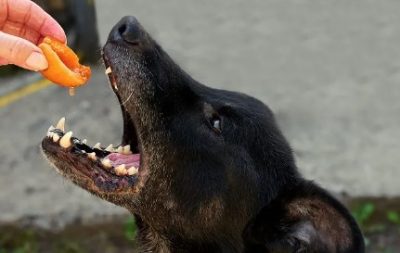Dogs can eat apricots, but only in moderation, as the pits can be harmful. Apricots are a delicious fruit that many humans enjoy, and it’s natural for dog owners to wonder if they can share this treat with their furry companions.
Fortunately, dogs can eat apricots, but there are a few things to remember. While the flesh of the apricot is safe for dogs to consume, the pits should never be given to them. The pits contain amygdalin, a compound that can break down into cyanide, which is toxic to dogs.
Table of Contents
Can Dogs Eat Apricots?
Apricots can make a healthy, nutritious snack for dogs in moderation. The flesh of fresh apricots contains beneficial vitamins, minerals, and antioxidants. However, apricot pits contain compounds that release cyanide, so the pits should permanently be removed before feeding apricots to dogs.
When fed in small quantities, apricots are non-toxic for dogs. However, some dogs may be allergic or intolerant to apricots. Introduce apricots slowly and watch for any signs of allergies, digestive issues, or choking hazards. The high sugar content means apricots should only make up a small portion of a dog’s diet.

The best way to feed apricots to dogs is to wash the fruit, remove the pit, cut it into bite-sized pieces, and serve a few small slices at a time. Monitor your dog’s reaction. Due to their high sugar concentration, introduce dried apricots even more slowly and sparingly.
Nutritional Value of Apricots for Dogs
Apricots can provide some beneficial nutrition for dogs. Some of the vitamins, minerals, and nutrients found in apricots that can be good for dogs include:
- Vitamin A – Supports vision, immunity, and skin/coat health.
- Vitamin C – Boosts immunity and acts as an antioxidant.
- Potassium – Important for muscle, nerve, and heart function.
- Fiber – Promotes digestive health.
So, small amounts of apricots can add supplemental nutrition to a dog’s diet. However, they contain natural sugars, so they should not make up much of a dog’s regular diet.
Potential Benefits of Apricots For Dogs
Eating apricots in moderation can offer some health benefits. Rich in natural vitamins and minerals, these fruits can provide a nutritional boost to your dog’s diet. Apricots are a good source of vitamins A and C, supporting a healthy immune system and promoting better skin and coat health. They also contain fiber, which aids in digestion and helps regulate bowel movements.
Apricots also contain essential minerals such as potassium, magnesium, and calcium. Potassium can assist in maintaining proper muscle and nerve function, magnesium promotes bone health, and calcium is crucial for strong teeth and bones.
However, apricots should only be given to dogs in moderate amounts, and the pit should be removed as it can pose a choking hazard. The high sugar content in apricots means that excessive consumption can lead to digestive upset and potentially contribute to weight gain in dogs.
Recognizing Apricot Parts Dogs Should Avoid
The most toxic part of an apricot for canines is the pit. Apricot pits contain amygdalin, which can be dangerous when ingested. Amygdalin is metabolized into cyanide in the body, posing a severe health risk for dogs.
In addition to the pits, the leaves and stems of apricot trees also contain chemicals that can harm dogs. These hidden dangers can lead to symptoms such as vomiting, diarrhea, difficulty breathing, and even seizures.
Keep apricot pits, leaves, and stems away from your furry friend to prevent potential health issues. If your dog accidentally consumes an apricot pit or exhibits any unusual symptoms after contacting apricot parts, seek veterinary attention immediately.
Are Apricots Safe for Dogs to Eat?
While apricots are not toxic for dogs, that doesn’t necessarily mean all dogs can safely eat apricots or handle them well. Here are some factors to consider:
- Allergies – Some dogs may be allergic or sensitive to apricots. Monitor for any allergy symptoms.
- Choking risk – Make sure to cut apricots into small pieces to reduce choking hazards, especially for small dogs. Remove pits.
- Sugar content – Dried apricots contain very concentrated sugar, so only give dried apricots in tiny amounts. Fresh is healthier.
- Digestive issues – Too many apricots could lead to diarrhea, gas or upset stomach. Start with a small amount.
So apricots can be acceptable for dogs in moderation, but introduce them slowly and monitor your individual dog’s reaction. Consult your vet if you have any concerns.
Quick Tips for Feeding Dogs Apricots
If you want to share some of your fresh apricots with your dog, follow these tips for safe serving:
- Remove pit/seed to prevent choking hazards or intestinal obstruction.
- Cut apricots into small pieces appropriate for your dog’s size.
- Serve only 1-2 small slices of apricot at a time to start.
- Introduce slowly over a few days to check for allergies or tummy issues.
- Make sure apricots only comprise a small portion of your dog’s diet.
- Avoid feeding dogs very high amounts of dried apricots.
Following these tips will allow your dog to enjoy apricots as an occasional healthy treat! Monitor your dog when giving any new food item. Check with your vet if you have any concerns about your dog eating apricots or other fruits.
Are Dried Apricots OK for Dogs?
Dried apricots pose additional risks and should only be fed to dogs in extreme moderation.
The dehydration process concentrates all components of the apricot, including sugar. The high sugar content means dried apricots can contribute to obesity, dental disease, and other health issues in dogs if consumed in large amounts.

Dried apricots are also very high in fiber, which can irritate some dogs’ digestive systems, leading to diarrhea or vomiting if they eat too many. Dried apricots’ sticky, chewy texture could also cause choking in dogs who do not thoroughly chew their food.
Additionally, the amygdalin compounds in apricot pits are more concentrated in dried form, making toxicity more likely if pits are accidentally ingested. Dogs with apricot allergies may also react more severely to the condensed compounds in dried fruit.
Symptoms of Apricot Poisoning In Dogs
While the flesh of apricots is not toxic to dogs, apricot pit poisoning does occur in rare cases when dogs consume a very high quantity of pits. The seeds/pits contain amygdalin, which breaks down into cyanide. Some symptoms of apricot pit poisoning in dogs may include:
- Excessive drooling
- Difficulty breathing
- Dilated pupils
- Hyperventilation
- Gum color changes to bright red
- Unsteady gait, trouble standing
- Collapse or loss of consciousness
Cyanide prevents blood cells from carrying oxygen throughout the body and results in hypoxia. Apricot pit poisoning requires immediate veterinary treatment to prevent severe injury or death.
Preventing apricot pit poisoning is as simple as removing the pit before feeding apricots to dogs. If an excessive amount of apricot pits is ingested, seek emergency veterinary care even if symptoms are not showing. Quick treatment with oxygen therapy can significantly reduce the risk of lasting harm to the dog.
FAQs on Can Dogs Eat Apricots
Can Dogs Safely Eat Apricots?
Yes, dogs can eat apricots in moderation. However, you should remove the apricot pit as it contains cyanide, which is toxic to dogs.
Are Apricots A Healthy Snack For Dogs?
Apricots can be a healthy snack for dogs, as they are low in calories and high in vitamins A and C. Remember to feed them in moderation.
Do Apricots Provide Any Health Benefits To Dogs?
Yes, apricots can provide health benefits to dogs. They are a good source of dietary fiber and antioxidants, which can support their digestive and immune systems.
What Precautions Should I Take When Feeding My Dog Apricots?
When feeding your dog apricots, remove the pit and any stems. Also, introduce them gradually, as some dogs may have digestive sensitivity to new foods.
Final Verdict
Dogs can safely eat apricots in moderation., as long as certain precautions are taken. However, removing the pits and seeds is crucial, as they can pose a choking hazard and contain potentially harmful substances.
It is always best to consult your veterinarian before introducing new foods into your dog’s diet to ensure their safety and well-being. Remember, the health and happiness of your furry friend should always be the top priority.
















